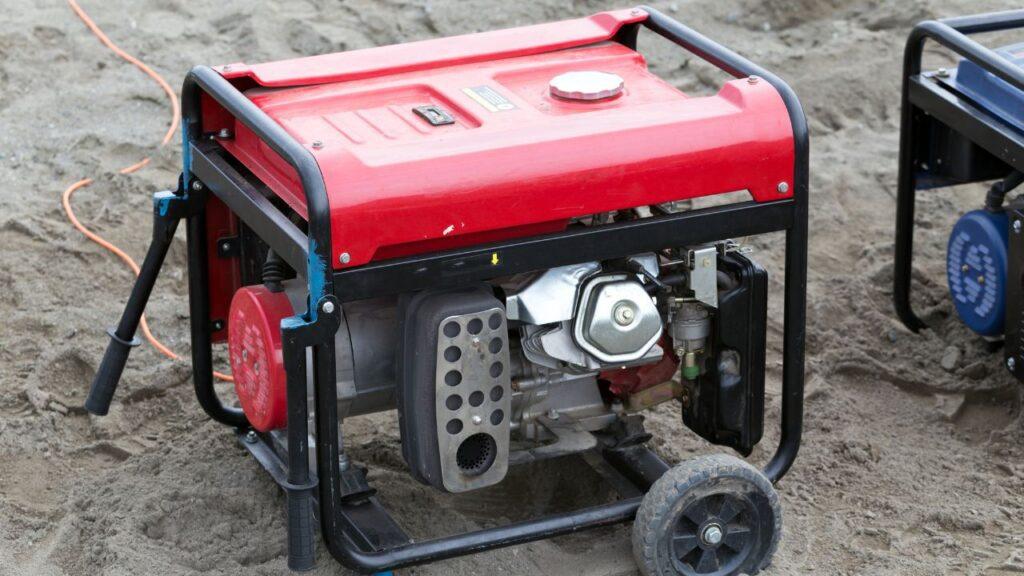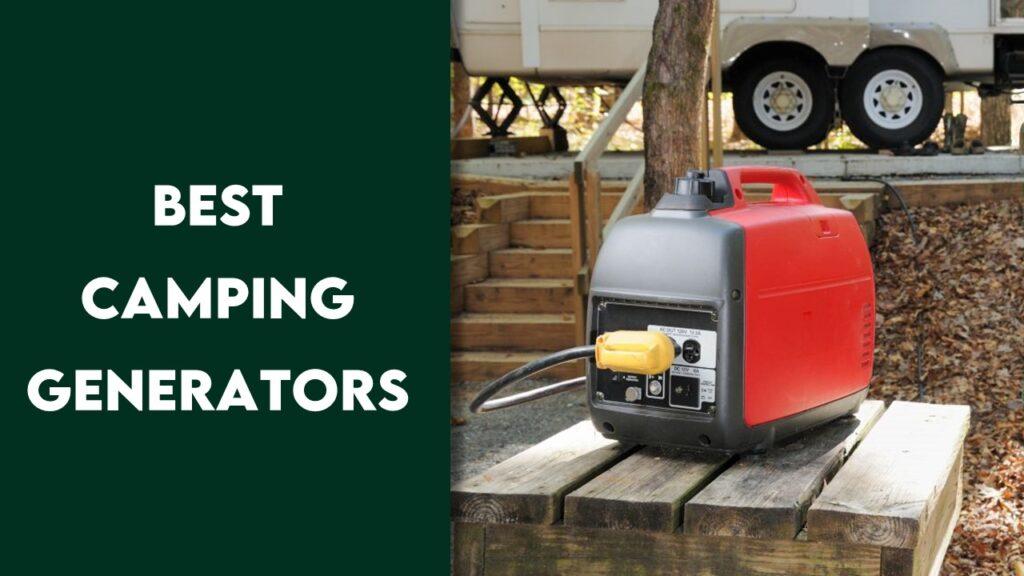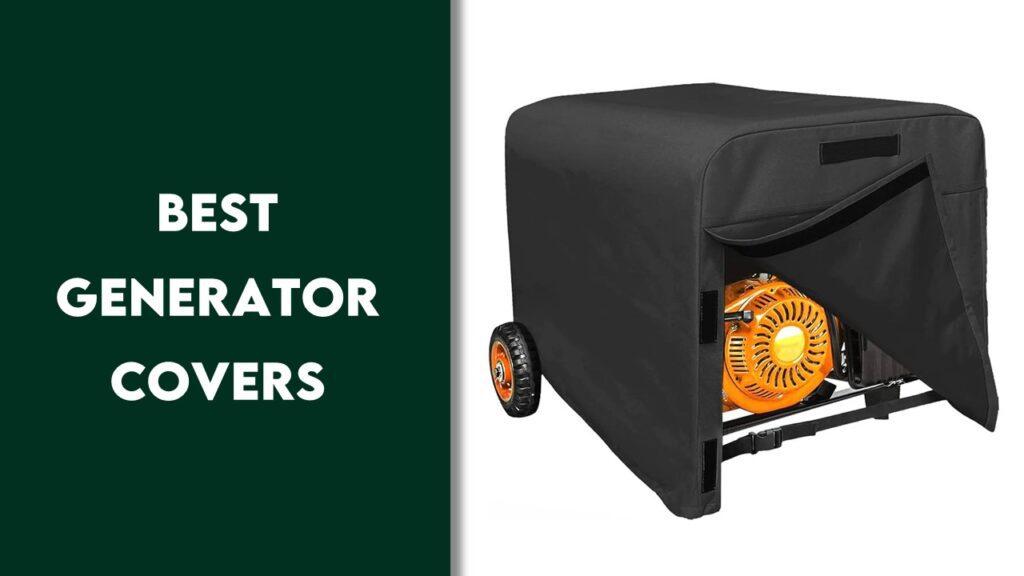Having the right emergency power generator can transform a potentially precarious situation into a manageable one, ensuring essential appliances, medical devices, and critical systems continue to operate uninterrupted. In this guide, we have extensively researched, reviewed, and ranked the 5 best portable emergency generators for home backup in 2025 for you to pick.
We’re reader-supported. When you buy through links on our site, we may earn an affiliate commission. As an Amazon Associate, we earn from qualifying purchases.
Our Top 5 Picks Of The Best Generators for Emergency Home Backup
1. Best Overall Option: Westinghouse 12500 Watt
2. Best Budget-Friendly Option: WEN DF475T Dual Fuel
3. Value for Money Option: DuroMax XP13000EH
4. Portable Option: Champion Power Equipment 4500-Watt
5. Emergency Standby Option: Generac 7291 26kW
What Is The Best Generator for Emergency Home Backup In 2025?
Choosing the right generator for emergency home backup requires careful consideration. Furthermore, it’s essential to understand your specific needs. Reliable power can greatly enhance your home’s safety during outages.
1. Best Overall Option: Westinghouse 12500 Watt

Key Specifications
- Brand: Westinghouse
- Wattage: 9500 watts running, 12500 peak watts
- Fuel Type: Dual fuel (Gasoline/Propane)
- Starting System: Remote electric start, manual recoil
- Engine: 457cc 4-Stroke OHV Westinghouse engine
- Weight: 210 pounds
From our perspective, the Westinghouse 12500 Watt Dual Fuel Home Backup Portable Generator stands out for its robust and versatile performance. Designed to handle everything from everyday power needs to unexpected outages, this emergency power generator for home offers dependable functionality and flexibility. The dual fuel capability allows seamless switching between gasoline and propane, making it an excellent choice for an emergency backup generator where fuel availability might vary.
Additionally, we value the comprehensive safety features built into this model. Automatic low oil shutdown and GFCI outlets ensure safe operation, even during demanding conditions. The inclusion of a remote start key fob adds a layer of convenience, allowing you to start the generator from indoors—a feature that’s particularly helpful during severe weather or emergencies.
Pros
- Handles a variety of appliances with dual fuel capability.
- Equipped with electric start, remote fob, and an intuitive VFT data center.
- Provides reliable power for up to 12 hours on a single tank.
- Features automatic low oil shutdown and GFCI protection for enhanced safety.
Cons
- At 210 pounds, it’s on the heavier side, requiring effort to move despite having wheels.
- While not excessively loud, it’s not the quietest in its category.
In our opinion, the Westinghouse 12500 Watt generator offers a reliable and powerful solution for emergency home generators. Its dual fuel capability, robust design, and thoughtful safety features make it a strong contender for those seeking a home emergency generator to safeguard their energy needs. Whether you’re preparing for a storm or ensuring consistent power for critical appliances, this generator provides peace of mind and dependable performance when you need it most.
2. Best Budget-Friendly Option: WEN DF475T Dual Fuel
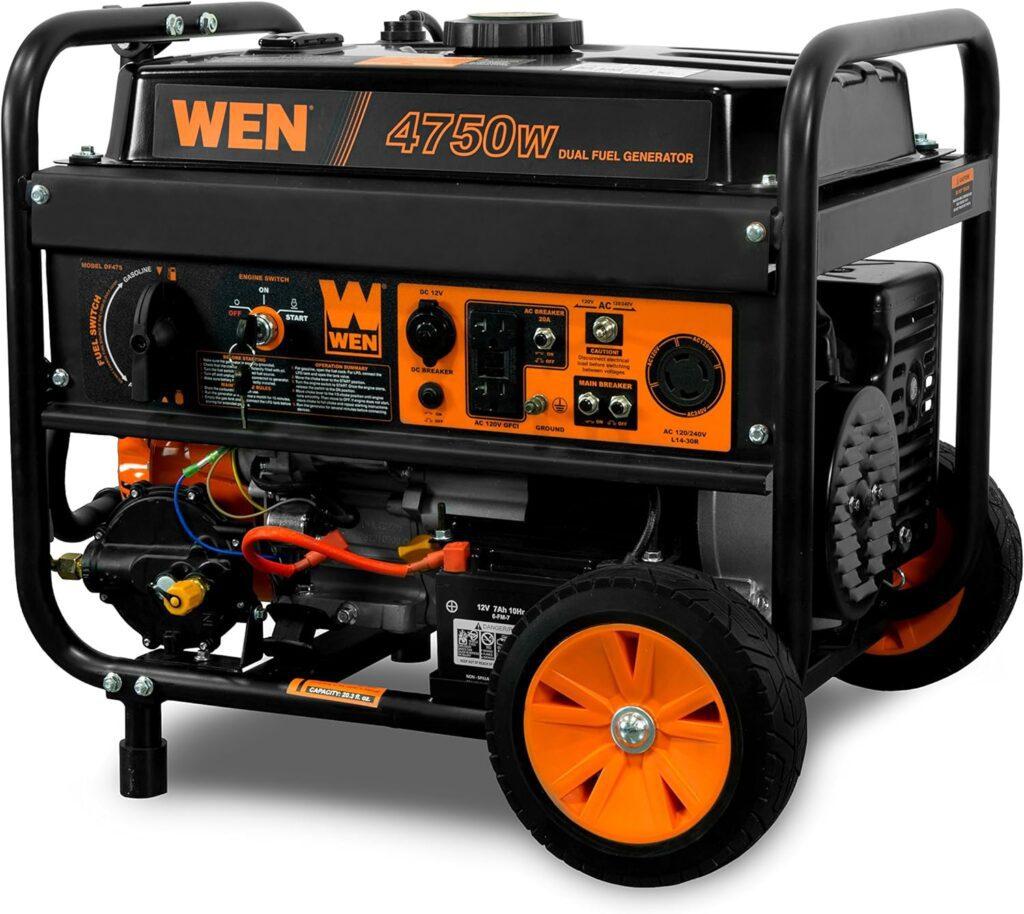
Key Specifications
- Brand: WEN
- Wattage: 4750 watts
- Fuel Type: Dual fuel (Gasoline/Propane)
- Starting System: Electric start
- Engine: 224cc 4-stroke OHV
- Weight: 105.8 pounds
From our experience, the WEN DF475T Dual Fuel Portable Generator stands out as a versatile and reliable emergency generator for home use. Its ability to switch effortlessly between gasoline and propane makes it a flexible choice for any emergency or outdoor activity. Furthermore, the electric start feature simplifies operation, allowing us to power up the generator quickly and efficiently whenever needed, especially during unexpected power outages.
Moreover, the portability of the WEN DF475T is enhanced by its well-designed wheel and handle kit, making it a portable emergency generator that’s easy to move around different locations. The robust engine and substantial output make it suitable as a dependable emergency power generator for home, capable of powering a variety of essential appliances during an outage or for use on a job site.
Pros
- Runs on both gasoline and propane, providing versatility in fuel choice.
- Convenient electric start makes starting the generator effortless.
- Includes multiple outlets and a voltage selector for various applications.
- Equipped with wheels and a handle for easy transportation.
Cons
- While portable, the unit’s weight may require some effort to move.
- Achieves optimal performance at half load.
In our view, the WEN DF475T is an excellent choice for those looking for a reliable and adaptable emergency backup generator in an affordable budget range. Its dual fuel capability and user-friendly features make it one of the best generators for emergency home use. This generator is thoughtfully designed for ease of use, ensuring continuous energy availability during emergencies. Whether you’re preparing for power outages or seeking a dependable generator for emergency home use, the WEN DF475T delivers dependable performance, making it a top contender for a generator which can be used for home backup power solutions.
3. Value for Money Option: DuroMax XP13000EH
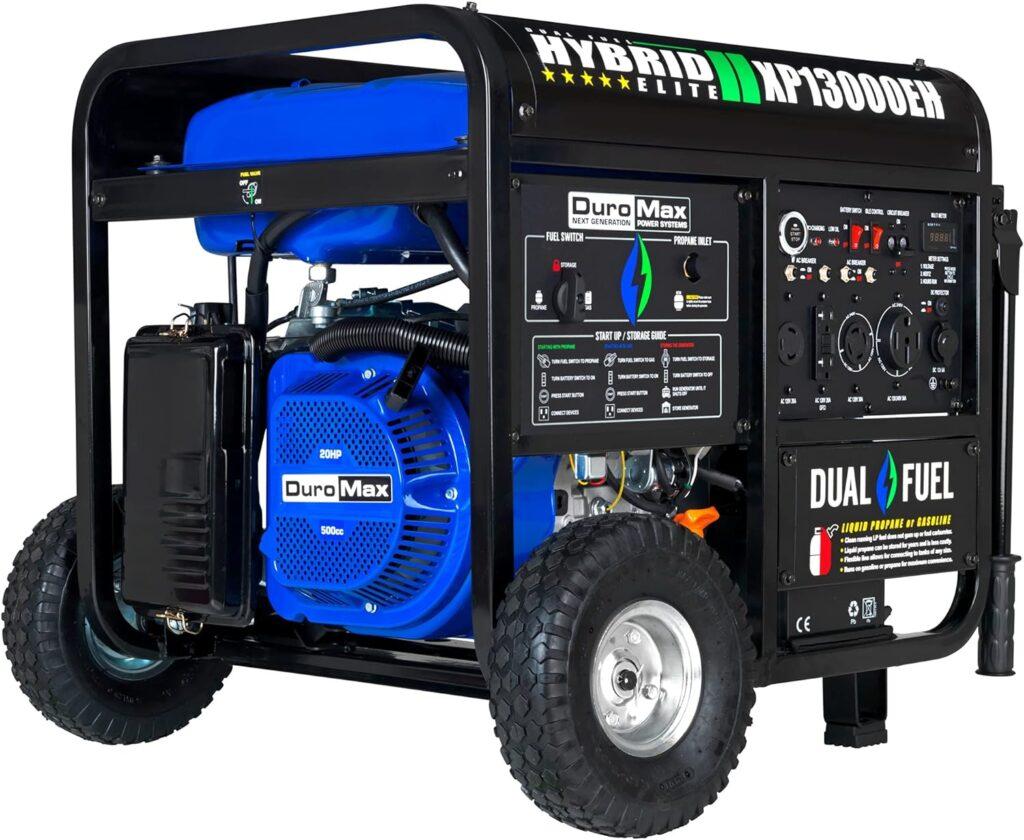
Key Specifications
- Brand: DuroMax
- Wattage: 13000 watts
- Fuel Type: Dual Fuel (Gasoline/Propane)
- Starting System: Electric Start
- Engine: 500cc OHV Engine
- Weight: 234 Pounds
From our perspective, the DuroMax XP13000EH stands out as a formidable dual fuel generator that combines versatility and robust performance. This unit seamlessly transitions between gasoline and propane, ensuring that we have a reliable power source regardless of fuel availability. Its powerful 500cc OHV engine delivers enough wattage to keep our home’s essentials running smoothly, even during extended power outages.
Moreover, the convenience of the electric start system and the durability of its all-metal construction make the XP13000EH a practical choice for emergency home backup. The inclusion of multiple outlets and safety features, such as CO sensors and GFCI outlets, ensures that we can power a wide array of appliances safely and efficiently.
Pros
- Provides 10500 running watts, ample for most home needs.
- Operates on both gasoline and propane.
- Includes CO sensor and GFCI outlets.
- All-metal frame and heavy-duty engine designed to last.
Cons
- At 234 pounds, it’s not the easiest to maneuver.
- Its larger dimensions require considerable storage space.
In our view, the DuroMax XP13000EH is an excellent choice among portable generators. This generator provides significant features, performance, and overall benefits for the cost it offers. Moreover, its dual fuel capability, coupled with significant power output and comprehensive safety systems, makes it an ideal option for ensuring that your home remains powered during emergencies. This generator’s ability to handle a variety of electrical demands with ease positions it as a top pick in our list for anyone seeking a dependable and adaptable backup power solution in our opinion.
4. Portable Option: Champion Power Equipment 4500-Watt

Key Specifications
- Brand: Champion Power Equipment
- Wattage: 4500 watts
- Fuel Type: Gasoline, Propane (LPG)
- Starting System: Electric Start
- Engine: 212cc 4-stroke
- Weight: 97 pounds
From our standpoint, the Champion Power Equipment 4500-Watt Inverter Generator exemplifies portable power flexibility and quiet operation, making it an indispensable tool for emergency home backup and outdoor activities. Its dual fuel capability allows us to choose between gasoline and propane, giving us the versatility needed for various situations. The electric start system, paired with Cold Start Technology, ensures it fires up quickly even in cold weather, which is a significant advantage.
Moreover, the quiet technology of this generator is particularly impressive. Operating at just 61 dBA, it’s no louder than a normal conversation, making it ideal for use in residential areas or campgrounds without causing a disturbance. This feature, combined with its clean power output, ensures that we can run sensitive electronics without worry.
Pros
- Offers flexibility in fuel choice.
- Ideal for quiet environments.
- Safe for sensitive electronics.
- Easy to move and transport.
Cons:
- While sufficient, there are longer-lasting options.
- Lacks a fuel gauge for easy monitoring.
In our view, the Champion Power Equipment 4500-Watt Inverter is an excellent choice for those who need a reliable, quiet, and efficient portable power source. Its combination of dual fuel capability, portability, and reduced noise level makes it a proper selection for our list, ensuring that you have a dependable energy solution that’s easy to carry and use and respectful of both the environment and your neighbors in our opinion.
5. Emergency Standby Option: Generac 7291 26kW

Key Specifications
- Brand: Generac
- Wattage: 26000 watts
- Fuel Type: Natural Gas or LP Gas
- Starting System: Automatic
- Engine: Generac G-Force 1000 Series
- Weight: 518 pounds
From our perspective, the Generac 7291 26kW stands as a powerhouse in the realm of home standby generators. With its massive 26,000-watt output, this generator effortlessly ensures that every corner of your home remains lit and operational during outages. Its seamless integration with a 200-amp transfer switch offers not just power but also comprehensive protection for your entire electrical system.
Moreover, the ability to monitor and control the system remotely via Wi-Fi adds a layer of convenience that we find invaluable. Whether we’re at home or away, having the capability to check on the generator’s status and receive maintenance alerts directly on our phones provides peace of mind that is hard to match.
Pros
- Adequate to handle entire home needs.
- Easy oversight from any location.
- Engineered for long-term durability.
- Designed to run without disruptive noise.
Cons
- Challenging to move; requires a permanent location.
- Installation by a professional is required.
In our view, the Generac 7291 26kW is an excellent choice for those seeking a reliable, high-capacity standby generator. Its advanced technology and robust build qualify it as a top option in our list for ensuring that your home stays powered in every situation. Its comprehensive features and strong performance make it a proper investment for significant peace of mind.
Types of Generators Available for Home Backup Power Use
When the lights go out and the neighborhood plunges into darkness, a generator can be your shining beacon of reliability. Choosing the right type of generator for emergency home backup isn’t just about finding a power source; it’s about securing peace of mind. From the compact portables to robust standbys, each type has its role in safeguarding your home.
- Standby Generators: These are the stalwarts of home backup power, providing a seamless transition during power outages. Wired directly into your home’s electrical system, they kick in automatically when the power goes down. They’re ideal for sustaining critical appliances for extended periods, from refrigerators to heating systems.
- Portable Generators: For flexibility and convenience, portable generators are the go-to. Easy to move and set up, they can power essential items and are perfect for shorter outages or as a backup for outdoor activities.
- Inverter Generators: If you value efficiency and quieter operation, inverter generators are the way to go. They adjust the electrical characteristics to deliver only the amount of power you need, making them perfect for electronics and smaller appliances.
- Solar Generators: As the most eco-friendly option, solar generators harness sunlight to produce power. They’re quiet, emission-free, and increasingly popular for homeowners focused on sustainability.
As we consider the diversity in generator types, it’s clear that whether you’re looking to power a few essentials or maintain normalcy throughout your entire home, there’s a solution tailored to your needs.
How Do Generators for Emergency Home Backup Work?
Understanding how generators for emergency home backup operate can demystify much of their appeal. At their core, generators don’t create electricity; they convert fuel into electrical power, ready to jump into action when your main power source fails.
- Mechanism of Action: Generators kick in when a sensor detects a disruption in your main power supply. Within seconds, they begin converting stored gasoline, propane, or diesel into power. For homes equipped with solar generators, energy from the sun is converted and stored for such emergencies.
- Power Delivery: The electricity generated is then channeled into your home’s circuit panel, supplying power to appliances and lights just as your usual electricity would. The transition can be so seamless that sometimes the only indication of a power outage is the gentle hum of the generator outside.
- Safety Features: Modern generators are equipped with features that ensure safety and efficiency. These include automatic CO2 shutoffs to prevent dangerous emissions, overload protection to safeguard the generator and connected appliances, and quiet technology to minimize disturbance.
Moreover, the efficiency and adaptability of generators have seen significant improvements, making them indispensable in times of need. Whether it’s keeping the lights on, ensuring your home office remains operational, or powering medical equipment, generators provide a robust line of defense against the unpredictable. Understanding the basic principles of how these powerful machines work not only increases your appreciation for their functionality but also enhances your ability to make an informed choice about the right generator for your home.
Do You Need Generators for Emergency Home Backup?
Deciding whether you need a generator for emergency home backup hinges on understanding your unique circumstances. Emergencies often come without warning, making preparedness key to maintaining normalcy. Let’s delve into the considerations that help determine the necessity of a backup generator for your home.
Assessing Your Home’s Energy Needs During an Outage
Calculating your home’s energy requirements during an outage is the first step towards preparedness. Begin by listing all essential appliances and systems that need power, such as refrigerators, heating systems, and medical devices. Then, tally their wattage requirements. This sum will give you a clear baseline for the generator capacity needed to keep your household running smoothly.
Benefits of Having a Dedicated Emergency Generator
The advantages of installing a dedicated generator for emergency home backup are manifold. Safety is paramount—generators ensure that critical medical equipment and heating systems stay operational.
Furthermore, the convenience of uninterrupted power can significantly reduce the stress associated with outages. Economically, the potential cost savings from avoiding hotel stays, spoiled groceries, and damaged appliances can be substantial.
As we reflect on these points, the value of having a dedicated generator becomes unmistakably clear. It’s not just about keeping the lights on; it’s about ensuring safety, comfort, and economic stability during unpredictable times.
How to Buy the Best Generators for Emergency Home Backup Power
Navigating the purchase of a generator for emergency home backup power isn’t merely about making a transaction; it involves careful deliberation of your unique power needs and the specific attributes of different generators. Let’s dive into the essential considerations to guide you in selecting a reliable generator that aligns with your energy demands.
Assessing Your Power Requirements
Start by determining how much power you need to run your household during a blackout. Are you aiming to power just the essentials, or do you need a whole-house generator? Calculating the total wattage required by your critical appliances ensures you select a generator with enough capacity to handle your load without overstraining.
To calculate the total wattage required:
Total Wattage Required = Sum of (Running Wattage + Starting Wattage)
- Running Wattage is the continuous power an appliance uses while operating.
- Starting Wattage is the extra power needed to start motorized appliances, such as refrigerators or air conditioners.
Here’s an example of power usage during an outage:
- Add up the running wattage of all appliances you want to power.
- Identify the appliance with the highest starting wattage.
- Add the highest starting wattage to the total running wattage for the final total.
Let’s say you want to power the following appliances:
| Appliance | Running Wattage (W) | Starting Wattage (W) | Total (W) |
| Refrigerator | 700 | 1200 | 1200 |
| Microwave | 1000 | 0 | 1000 |
| Sump Pump | 750 | 1500 | 1500 |
| LED Lights (10 bulbs) | 100 | 0 | 100 |
| Wi-Fi Router | 50 | 0 | 50 |
| Phone Charger | 20 | 0 | 20 |
Step-by-step calculation:
1. Add the running wattages:
700 + 1000 + 750 + 100 + 50 + 20 = 2620 W.
2. Identify the highest starting wattage:
The sump pump has the highest starting wattage at 1500 W.
3. Add the highest starting wattage to the total running wattage:
2620 W + 1500 W = 4120 W.
Recommended Generator Size
Based on the calculation, you would need a generator with a minimum capacity of 4,500 to 5,000 watts to comfortably power these appliances, leaving a safe margin for additional needs.
Generator Sizing Table for Common Setups
| Setup | Approx. Wattage Needed | Recommended Generator Size |
| Basic Essentials (lights, fridge, Wi-Fi) | 2,000–3,000 W | 3,000–4,000 W |
| Medium Load (essentials + microwave, sump pump) | 4,000–5,000 W | 5,000–6,000 W |
| Large Load (whole house) | 7,500–12,000 W | 9,000–12,500 W |
Using this method ensures you choose the best generator for emergency home backup power that meets your household’s energy needs without overloading or underperforming.
Choosing the Right Fuel Type
The choice of fuel is crucial in selecting the right home backup generator. Gasoline, diesel, propane, and dual-fuel generators each offer advantages depending on availability, storage life, and cost-effectiveness. For instance, while gasoline might be readily available, propane and diesel are more stable for long-term storage, making them excellent choices for emergency power generation.
Deciding Between Portable and Standby Generators
Consider whether a portable generator or a standby generator better suits your needs. Portable generators for home backup are flexible and can be used in various locations, but they require manual start-up and monitoring. On the other hand, standby generators for emergency home backup offer the convenience of automatic operation and immediate response during a power outage.
Evaluating Noise Levels
Noise is a significant factor, especially in residential areas. Look for quiet generators for home use that operate around 60 dB, which is comparable to a normal conversation. This feature is particularly important if noise regulations are strict in your locality or you prefer minimizing disruption.
Examining Starting Mechanisms
Ease of operation is another important consideration. Generators with an electric start provide the utmost convenience, particularly those that can be activated remotely via a panel or a mobile app. This feature is invaluable during inclement weather conditions or when physical interaction with the unit is impractical.
Analyzing Run Time and Fuel Efficiency
Efficiency and run time dictate how often you’ll need to refuel your generator during extended outages. Opt for models that offer long run times at moderate loads to minimize refueling frequency. Fuel-efficient generators not only save on operational costs but also ensure continuous power without frequent maintenance interruptions.
Prioritizing Safety Features
Safety cannot be overlooked when choosing a generator for emergency home backup. Features such as carbon monoxide detectors, automatic shut-off systems for low oil levels, and circuit protection not only safeguard the generator but also protect your home and family from potential hazards.
Ensuring Compatibility with Transfer Switches
For seamless integration into your home’s electrical system, ensure that the generator is compatible with a transfer switch. This setup is crucial for home standby generators, as it automates the transition from the main power supply to the generator during outages, enhancing convenience and safety.
Considering Maintenance and Durability
Lastly, evaluate the generator’s build quality and ease of maintenance. Durable generators with robust engines and easily accessible maintenance features can significantly extend the lifespan of the unit while ensuring reliable operation during crucial times.
Professional Installation vs. DIY: What You Need to Know
When it comes to setting up a generator for emergency home backup, the debate between professional installation and DIY projects is crucial. While DIY appeals to the hands-on homeowner, understanding the intricacies of safety and regulations is essential. Let’s explore what you need to know to make an informed decision.
- Safety Considerations: Installing a generator involves electrical and fuel-related tasks that pose significant safety risks. Proper grounding, fuel line connections, and ventilation are critical to prevent fires, explosions, and carbon monoxide poisoning.
- Regulatory Compliance: Local codes and regulations often dictate specifics regarding generator installation. These may include placement restrictions, noise ordinances, and emissions standards that must be adhered to.
- When to Hire a Professional: If the installation process seems daunting or if your local regulations require professional certification, hiring a skilled technician is advisable. Professionals ensure that your generator is installed safely and in compliance with all local codes, providing peace of mind.
Considering these points, opting for professional installation can often be the safer and more compliant choice, especially for those unfamiliar with the technical demands of generator setup.
Routine Maintenance to Ensure Reliability
The reliability of your generator for emergency home backup heavily relies on consistent maintenance. A well-maintained generator is ready at a moment’s notice, crucial during unexpected power outages. Here’s a straightforward maintenance checklist and schedule to keep your generator in prime condition.
Maintenance Checklist:
- Regular Engine Checks: Ensure oil levels are sufficient, and air filters are clean.
- Fuel System: Regularly inspect for leaks and ensure fuel is fresh since old fuel can cause issues.
- Battery Inspection: Check battery charge and clean connections to prevent starting issues.
Maintenance Schedule:
- Weekly: Run the generator for at least 30 minutes to charge the battery and check for any operational issues.
- Monthly: Change oil if in frequent use, and inspect fuel and air filters.
- Annually: Have a professional service check to handle more complex systems like spark plugs and timing adjustments.
Adhering to this schedule not only prolongs the life of your generator but also ensures it’s ready when you truly need it. Remember, regular maintenance is the key to dependable generator performance during emergencies.
Safety Precautions for Using Generators for Emergency Home Backup
When deploying generators for emergency home backup, safety must be your top priority. It’s crucial to adhere to these precautions to protect your home and family. Make sure your generator is always placed outside, far from windows and doors, to prevent carbon monoxide from creeping indoors. Also, using the right power cords and keeping the generator dry and grounded protects against electrical hazards. Following these safety steps ensures that when you need your generator the most, it runs safely and efficiently.
Cost Analysis of Generators for Emergency Home Backup
Understanding the costs associated with generators for emergency home backup is essential for any homeowner considering this significant investment. This analysis helps balance the upfront expenditure against the potential long-term economic benefits.
Initial Investment vs. Long-Term Benefits
Investing in a generator involves upfront costs but the long-term benefits can be substantial. A reliable generator not only keeps the lights on but may also reduce your home insurance premiums by lowering the risk of damage during power outages.
Additionally, it helps avoid costs related to spoiled food, disrupted work, and even temporary lodging expenses during prolonged blackouts. Essentially, a generator acts as a financial safety net, providing peace of mind and financial benefits beyond just emergency power.
Considering Fuel Types and Their Costs Over Time
The choice of fuel for your generator—be it gasoline, diesel, propane, or natural gas—can significantly impact both initial and ongoing expenses. While gasoline generators might seem cost-effective at first, propane and natural gas units often offer greater efficiency and have a longer shelf life, which can translate into savings over time.
Moreover, these fuels are typically more stable in pricing and availability, which adds an extra layer of reliability and cost predictability to your emergency preparedness plans.
Selecting the right generator, therefore, involves a careful evaluation of not just the purchase price, but also the long-term savings and operational benefits it brings.
Enhancing Your Home’s Energy Resilience
Boosting your home’s energy resilience is a proactive approach to ensure continuous power during outages, merging sustainability with reliability. By adopting advanced power solutions, you not only secure your energy needs but also contribute to a more sustainable future. Let’s explore how you can transform your generator setup into a robust and efficient energy system.
Integrating Generators with Renewable Energy Systems
Integrating generators with renewable energy sources like solar panels or wind turbines is an excellent strategy for achieving greater energy independence. This hybrid approach allows you to capitalize on renewable energy during sunny or windy days, storing excess power for later use.
When renewable sources aren’t enough, your generator steps in seamlessly, extending the life of stored fuel and minimizing your carbon footprint. Automated systems manage the transition between power sources smoothly, ensuring you always have electricity without any hassle.
Smart Generators for Emergency Backup Power Management in Home
Enter the era of smart generators, where convenience meets efficiency. These advanced systems come equipped with technology designed to streamline energy management. With features that allow for remote monitoring and control, you can manage your generator directly from your smartphone.
This capability means you can adjust settings, track energy usage, and receive maintenance alerts all in real-time, ensuring your generator is always running at peak efficiency. It’s not just about having backup power; it’s about having smart backup power that integrates seamlessly into your digital lifestyle.
Addressing Common Concerns About Generators for Home Backup
Generators are indispensable for ensuring power during outages, but they come with challenges that need careful consideration. Let’s address some common concerns associated with home generators to help you maximize their benefits without compromising your living space or comfort.
Dealing with Noise and Space Constraints
The issue of noise and the space a generator occupies are significant considerations for any homeowner. Thanks to technological advancements, solutions are at hand. Modern generators are designed to be more compact, providing substantial power output without taking up too much space—ideal for smaller properties or urban settings. Soundproof enclosures can also be a game-changer, significantly reducing operational noise to ensure your home remains a peaceful sanctuary.
Fuel Availability and Storage During Emergencies
Proper planning for fuel storage and availability is a cornerstone of effective emergency preparedness. Ensuring you have an adequate supply of fuel, safely stored and ready for use, is crucial. Consider diversifying your fuel options with multi-fuel generators that can run on gasoline, propane, or diesel.
This flexibility can be invaluable during widespread outages when certain fuel types may be harder to procure. Additionally, using fuel stabilizers can extend the life of your fuel, ensuring that it remains viable for when you need it most.
These enhancements and considerations are not just about powering through an outage; they’re about doing so efficiently, sustainably, and with minimal disruption to your daily life. By addressing these key aspects, you can truly optimize your generator for emergency home backup and enjoy peace of mind knowing you’re well-prepared for any situation.
Wrapping It Up!
IIt’s clear that choosing the right generator is not just about preparing for power outages—it’s about keeping your home safe, functional, and comfortable, no matter what life throws your way. A reliable generator, whether it’s an emergency generator for home or a portable emergency generator, stands ready to ensure that essential appliances, medical devices, and other necessities continue to operate seamlessly during a crisis.
Moreover, understanding the range of options available—from robust standby generators to versatile portable models—helps you tailor your choice to fit your specific needs. For many, investing in a dependable emergency backup generator or a home emergency generator can mean the difference between merely enduring a power outage and thriving through one. By exploring options like renewable energy integration or smart generator technology, you can not only enhance efficiency but also reduce costs and your ecological footprint.
The peace of mind that comes from having a generator for emergency home use cannot be overstated. It’s not just about keeping the lights on—it’s about protecting your family’s safety and comfort while avoiding the financial strains caused by unexpected outages.
In the end, choosing the right generator is about more than convenience; it’s about creating a resilient future for your home and loved ones. It’s a decision that provides both immediate comfort and long-term security, making it an investment that truly matters.
Related FAQs
What Generator Capacity Is Necessary for a Typical Home?
Assess the total wattage of essential appliances to determine the generator size that meets your needs during an outage.
Is Self-Installation of a Home Generator Advisable?
It’s possible for those with technical skills, but professional installation is advised for safety and to meet regulatory standards.
How Frequently Should I Operate My Generator for Optimal Performance?
Regularly running your generator for about 30 minutes each month is recommended to keep it in prime condition.
Which Fuel Type is Most Efficient for Home Backup Generators?
The efficiency varies, but propane and natural gas are popular due to their reliability and lower maintenance.
Can Portable Generators Handle the Power Needs of an Entire Home?
While portable generators are useful for limited applications, standby generators are typically needed for comprehensive home backup.
At our core, we’re a group of passionate generator, inverter, solar energy, battery enthusiasts. We dive deep into the world of tech, especially when it’s about powering your home, RV or outdoors. We try to provide as much value to the readers with our information and how to blog articles as possible. For affiliate articles our honest and transparent reviews of essential tech products are rooted in real-world experience. We take great satisfaction in offering unbiased evaluations, ensuring that you can make informed decisions when investing in your desired techs.


